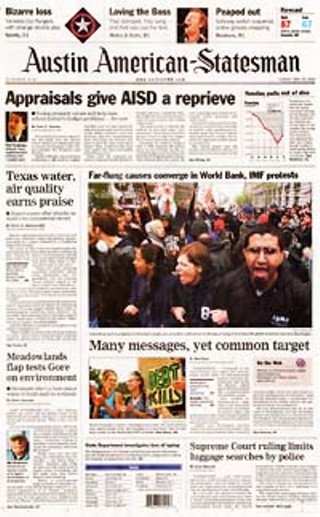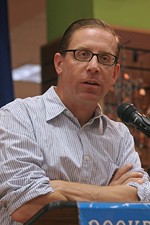Media Clips
Hometown Hero: Texas Press Corps Has a Soft Spot for Bush
By Lee Nichols, Fri., May 12, 2000

George W. Bush surely must pine for the days before he embarked on this hard, arduous journey in search of the holy grail. It was so easy back then -- the press loved him here in Texas. He'd kid around with the reporters and address them by name, like they were old pals. And they'd return the favor -- they'd share a laugh with him, jot down a few notes about the subject of that day's press conference, and then agree amongst themselves about how darned likable he was. It was a sweet relationship. But now things are different. He's not the media's darling any more. Now that the stakes are raised and he's moved out onto the national stage, the journalists are suddenly vicious. They're asking hard questions. During the Republican primaries, they fell in love with his main opponent. There was even that damn Yankee who sprung the foreign leaders pop quiz on him. Everything has changed.
Well, not everything. The national media may be a pain, but the Texas press corps still has a soft spot for the Guv.
That's certainly the view from here in Austin, anyway. "Media Clips" has groused before about the way our local daily's news staff, most notably Capitol bureau chief Ken Herman, tended to treat Bush with kid gloves. His race against Garry Mauro was a joke, and the Statesman helped him along with very uncritical coverage, culminating in fawning profile pieces a few weeks before the election. Even the Statesman's editorial board, though it had criticized nearly every move he made, rewarded him with its endorsement.
Texas Monthly was no better -- in fact, their main package of Bush pieces might as well have been Bush's press kit. TM executive editor Paul Burka even threw in a flattering write-up on Bush's press secretary, Karen Hughes, for good measure.
Two years later, these two Austin-based institutions would still love to see their boy Bush rise all the way to the top -- a tide which would no doubt lift their own boats as well.
April 17-18 saw two consecutive days of Statesman reporter Scott Greenberger practically doing PR work for G.W. The first day featured a tortured bit of apologia titled "Gore's take on Texas misses deep roots of poor rankings." The premise was that Al Gore's blistering (and accurate) potshots at the state of the state of Texas aren't fair -- Texas' poor rankings in numerous quality-of-life measurements (such as fifth-worst in poverty, second in hunger, second in number of children without health insurance, and 45th in home ownership) are not Bush's fault, so he shouldn't be held accountable for them.
"It's fair to challenge Bush on what he's done to improve health and housing," Greenberger wrote, "particularly because the state has enjoyed budget surpluses during his tenure. But taxes, demographics, and even the state's past, all play a part in Texas' low rankings. Those factors predate Bush, and they're likely to persist long after he's gone." Thus blame for Texas' dismal rankings in these categories is shifted from Bush to our citizenry's "bootstrap mentality" and "frontier ethos."
These points were echoed by two similar pieces from the staff of Texas Monthly, although not actually in the magazine itself: The first was in the March 27 issue of the online magazine Slate, in which readers were "allowed to eavesdrop" on an e-mail conversation between several TM editors and writers (go to Slate.msn.com/dialogues/00-03-27/dialogues.asp?iMsg=0, and then follow the conversation through the links in the left-hand column). The other was an op-ed by Burka in the April 28 edition of The New York Times, reprinted a week later in the Statesman.
Like Greenberger, Burka reprimanded Gore for his attacks and wrote, "The question that is relevant to the 2000 campaign, however, is not Texas' shortcomings but how many of them can be attributed to Governor Bush."
Texas' problems are not Bush's fault, Burka said, for three reasons: "Texas has a conservative political culture that constrains what any governor can do. It existed long before Mr. Bush won the governorship in 1994 and will survive long after he leaves it. ... Second, as the voters in the primaries this winter were instructed over and over, Texas' governor has very little power. ... Third, Texas is a poor state."
Burka had previously expressed these sentiments in the Slate article, and was joined by other staffers in complimenting Bush on his "accomplishments." In particular, editor Greg Curtis and contributing editor Patricia Kilday Hart, who are enamored of Bush's relentless drive to make the TAAS test the be-all and end-all of Texas education, crowed about the governor's achievements. (When Bush forced teachers to focus on the test, it did result in higher scores. But, as senior editor Joe Nick Patoski noted -- echoing a common sentiment among teachers -- Bush "has ushered in an era where testing has taken precedence over learning in the classroom.")
It's a strange way to look at a political leader: Give him the credit when things go right, but don't expect him to shoulder the blame for the problems. Not wanting to endorse Bush outright, Burka praised Bush with faint damnation in the Times: "If Mr. Bush can be faulted, it is not for the longstanding problems of Texas, but for his minimalist approach to leadership. He believes that his role is to identify a few priorities and spend his political capital on those alone. ... What Al Gore should be questioning is not Mr. Bush's record, but whether the governor can shed the parochial outlook of his Texas constituency for a broader vision."
The truth is much simpler: Bush isn't constrained by the culture; he is the champion of it. Don't question his record? That parochial outlook is his record. At least LBJ, for all his faults, showed some willingness to try to reach beyond that parochialism before he ascended to the presidency; we must look to Bush's record to realize he has done nothing of the sort.
We must also look at his record to see that he is completely unwilling to challenge the corporate powers-that-be, a much bigger factor than any "parochial constituency." Which brings us to his record on the environment, and the second article of Greenberger's double-header.
The story, positioned prominently above a piece questioning Gore's commitment to the environment, was headlined "Texas air, water quality praised" -- no doubt a shock to anyone at all familiar with Texas' environment. The story was based on a study by the Pacific Research Institute (PRI), blandly described by Greenberger as "a California think tank."
Anyone who read beyond the first page could hear the voice of the opposition from Sierra Club regional director Ken Kramer. But even then, the description of PRI didn't get much deeper than a soundbite quote from Kramer about the fact that the organization receives some funding from corporations and conservative groups. Even more curious was the Statesman's total omission of the fact that while the study was put together by PRI, it was actually published by the Texas Public Policy Foundation (TPPF) -- a group backed by ultraconservative San Antonio businessman James Leininger, whose lavish spending in the 1998 elections played a major role in the Republican sweep of statewide elected offices. TPPF also led the charge against light rail in San Antonio.
A half-hour on the Internet could have produced a different story. A quick look at PRI's Web page (www.pacificresearch.org), tells you what you're really dealing with: a group that preaches "free market" reforms to just about every problem, attempts to "smash the myth" about workplace discrimination against women and tries to deny that urban sprawl is a problem.
A brief look at the study (available at www.tppf.org) could also have revealed how weak it is, full of misleading statistics and straw-man arguments. It doesn't examine the role that federal regulation played in improving environmental conditions in Texas, and one section of the study, on land use, makes the assertion that "Texas is not in danger of 'running out of land'" -- as if anyone had ever made that claim. Greenberger did, at the very least, give Kramer some space to refute PRI's claim that hot weather is the real cause of ozone, not people driving their cars.
Actually, Greenberger gave Kramer quite a few quotes. The bigger problem with the story was its placement and headline by Statesman editors. Imagine if the headline had been "Texas air, water quality praised by right-wing ideologues." In that context, it's hard to imagine it being placed any more prominently than a quick mention in the "News Briefs" section.
To the Statesman's credit, the editorial board attacked the study the next day (and Lt. Gov. Perry, who championed it). The board did a much better job than the news department of exposing just who PRI is.
Still, the board has its own weaknesses -- chief among them inconsistency. From the frequency with which they attacked Bush throughout the 1999 legislative session, one might get the impression that the board doesn't like the job he's done. But it was they who endorsed him in 1998. And more recently, the board criticized the Congressional Hispanic Caucus for trying to connect Bush to the racist comments made by State Health Commissioner Reyn Archer -- as if to say Bush shouldn't be tied to one of his own appointees, who could end up in a national position if Bush wins in November.
The Texas Monthly bunch practically sidestepped environmental issues altogether, except for a comment by Burka in Slate that "long before George W. Bush came to office, the great majority of Texans had decided that they were willing to tolerate some carcinogens in the air in return for industrial jobs (in Houston, it's called 'The Smell of Money') ... "
Such a comment shows a frighteningly shallow knowledge of Texas political history and the obstacles that existed for many years to block the working class from the kind of meaningful political participation which might have forced industries to clean up their act.
Of course, if Burka really believes Texas is a poor state -- rather than a state where those with wealth have been mighty stingy about sharing it with the workers who helped create it -- then we can see the full depth of his understanding of Texas history.
Aside from Patoski's comments, the best quote to come out of the TexMo bunch was from associate editor Pam Colloff: Referring to the press as a whole -- but unintentionally describing the Texas press in particular -- she wrote, "the press -- our magazine included -- has extended an awful lot of good will toward Bush. ... The press has been too easy on Bush, and that has been a disservice to him. The real test for him may come too late in the game." Not to mention a disservice to the public ... who may also be coming into this a bit late in the game.
Project Censored
Every year, Project Censored, a left-wing media research group based out of Sonoma State University in California, produces Censored: The Year's Top 25 Censored Stories, a book compiling what the group views as important but undercovered news stories of the year -- usually, topics that zreceived mention only in the alternative press. No Texas publications managed to land a story in this year's top 25, but Project Censored did confer honorable mention only status on "Washington's 10% Solution," from The Progressive Populist, a twice-monthly opinion journal published in Storm Lake, Iowa, but edited here in Austin by Jim Cullen.
The story, a commentary by Wayne O'Leary, detailed how government policy is largely formulated with the interests of corporate stockholders in mind, despite the fact that 90% of all stocks are owned only by the richest 10% -- leaving the rest of the citizenry either ignored or damaged by the resulting legislation.
For more info on The Progressive Populist, call 447-0455 or go to www.populist.com. The 2000 edition of Censored is at local bookstores, or go to www.projectcensored.org. ![]()
Got something to say on the subject? Send a letter to the editor.








